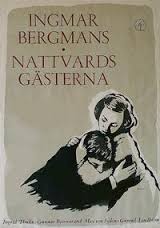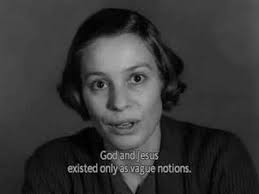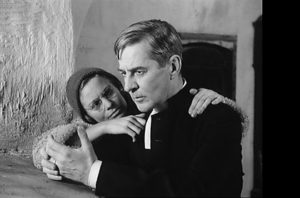 In Winter Light – Jonas Persson, we considered Ingmar Bergman’s remarkable 1963 film Winter Light, and in particular a point about the despondency of Jonas Persson, and how the main character, clergyman Tomas, dealt with it.
In Winter Light – Jonas Persson, we considered Ingmar Bergman’s remarkable 1963 film Winter Light, and in particular a point about the despondency of Jonas Persson, and how the main character, clergyman Tomas, dealt with it.
Now we look at Tomas’ interaction with another of the characters, Marta. Marta is Tomas’ atheist girlfriend. Throughout, we come to see Marta as passionate and genuine; a contrast to Tomas’ reserved countenance and tortured self-indulgence. Perhaps we’re to understand from this that being a Christian doesn’t make one better morally. Indeed, perhaps Bergman meant the opposite: that Tomas’ faith, while he had it, made him worse.
 It is clear that Marta understands Tomas’ faith well, though she rejects it. His faith is “obscure and neurotic.” It is “somehow cruelly overwrought with emotion, primitive.” She says: “one thing in particular I have never been able to fathom: your peculiar indifference to Jesus Christ.” Marta is confused that Christians like Tomas don’t behave as if they believe the things they say they believe. Tomas is indeed overwrought with emotion, and his self-directed nature does make him indifferent to the person of Christ. If Tomas’ faith were an exemplar for all of Christianity, it would be understandable that Marta would question it just on that basis.
It is clear that Marta understands Tomas’ faith well, though she rejects it. His faith is “obscure and neurotic.” It is “somehow cruelly overwrought with emotion, primitive.” She says: “one thing in particular I have never been able to fathom: your peculiar indifference to Jesus Christ.” Marta is confused that Christians like Tomas don’t behave as if they believe the things they say they believe. Tomas is indeed overwrought with emotion, and his self-directed nature does make him indifferent to the person of Christ. If Tomas’ faith were an exemplar for all of Christianity, it would be understandable that Marta would question it just on that basis.
 Marta has written Tomas a letter, to air the feeling she has that Tomas doesn’t really love her, though she loves him. She is quite right about that, as we will see most vividly in a lacerating speech Tomas makes to her later. In the letter, Marta speaks of Tomas’ revulsion to an illness Marta previously had; one that affected her hands and scalp. Marta had asked Tomas if he thought prayer was effective. He said yes. But then it had never occurred to Tomas to pray for healing of her hands. He agrees to pray for her then, but is unable to, because of his revulsion at her exposed sores. When he is unable to pray, she says that she will do it for him, and she proceeds with this remarkable cry to God:
Marta has written Tomas a letter, to air the feeling she has that Tomas doesn’t really love her, though she loves him. She is quite right about that, as we will see most vividly in a lacerating speech Tomas makes to her later. In the letter, Marta speaks of Tomas’ revulsion to an illness Marta previously had; one that affected her hands and scalp. Marta had asked Tomas if he thought prayer was effective. He said yes. But then it had never occurred to Tomas to pray for healing of her hands. He agrees to pray for her then, but is unable to, because of his revulsion at her exposed sores. When he is unable to pray, she says that she will do it for him, and she proceeds with this remarkable cry to God:
God, why have you created me so eternally dissatisfied? So frightened? So bitter? Why must I realize how wretched I am? Why must I suffer so hellishly for my insignificance? If there is a purpose to my suffering, then tell me, so I can bear my pain without complaint. I’m strong. You made me so very strong in both body and soul. But you never give me a task worthy of my strength. Give my life meaning and I’ll be your obedient slave.
She seems to be speaking passionately for herself, but that would presuppose that she believes God is. If we understand her to be speaking for Tomas, then this speech applied to him is devastating. Regardless, what insight from one who says she does not believe, into the questioning among those who do.
Marta recognizes that she achieves what she asked for, though she doesn’t acknowledge that it’s an answer to prayer. “Life is messy enough without taking into account the supernatural.” She now has a task worthy of her strength: Tomas, who never returns her love. At the end of her letter she writes: “I love you and I live for you.” She finds happiness, of a sort, in being allowed to live her life for someone else.
In the end, she longs for a truth to believe in, just as Tomas does, but we have no reason to suppose she finds it. Her unquestioning devotion to Tomas is all that she has. It takes the place of the faith she wishes she could have.

Like the new set up. This week, last week, 2 weeks ago. Enjoy reading your blog!
S. Rubanowice
Thanks very much. I have one more to go, I think, on Winter Light.